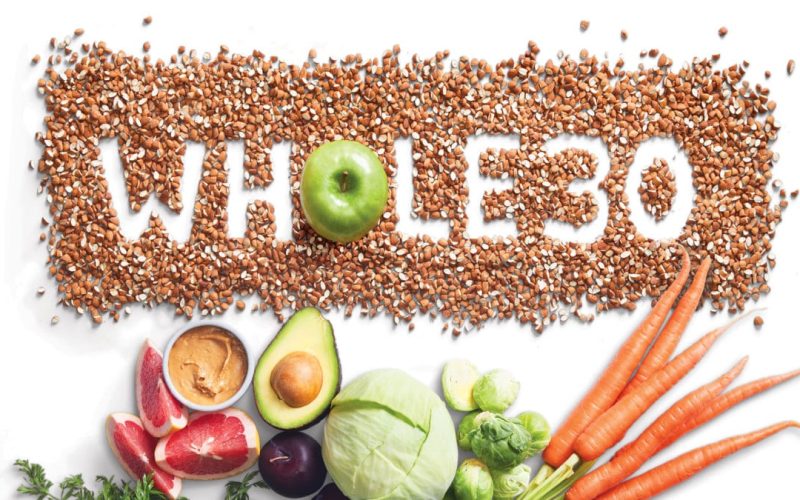Whole30 is a month-long diet plan that promotes a healthy lifestyle by eliminating common foods.
The diet is based on the premise that certain foods in our daily diet can be harmful to our health, and cutting them out can make us healthier.
This category includes foods such as sugar, grains, alcohol, legumes, dairy, and certain food additives.
Nutritionists Dallas and Melissa Hartwig created the Whole30 diet program in 2009 after they wrote the New York Times bestseller It Starts with Food.
The program was promoted as a way to reset your metabolism and restructure your relationship with food.
During one month, followers will eat whole, unprocessed foods like vegetables, fruits, healthy fats, animal protein, and nuts.
After 30 days, you will gradually reintroduce the forbidden food groups to check for reactions.
The diet plan has been the topic of debate for some time now. Some critics believe it is another unsustainable diet fad, even though followers believe it can enhance different aspects of health.
How Does the Whole30 Diet Work?
The idea behind the program is simple: completely eliminate foods that may harm your health for four weeks.
Once the initial four weeks have elapsed, gradually reintroduce the foods you miss while monitoring how your body responds to them.
You will be subjected to following a set of simple but strict rules. For the next 30 days, you will be given a list of allowed foods and off-limit foods, which you will strictly adhere to. Going off-track means starting all over again from day one.
The founders believe that strict adherence enables your body to reset in isolation from certain foods that may cause hormone imbalances, inflammation, or gut disruptions.
Whole30 doesn’t require calorie tracking, portion measurements, or point counts, unlike other diets.
Also, body measurements and weight measurements are strictly reserved for the first and last days of the program.
What Are the Benefits of the Whole30 Diet?
While most people follow the Whole30 diet plan in the hopes of losing weight, the program is also believed to help in the following areas
- Balancing the immune system
- Healing the digestive tract
- Improving medical conditions
- reduced food craving
- Higher energy levels
- Improved sleep
- Change your thoughts and attitude towards food
What Foods Are Accepted in the Program?
Followers are allowed to eat whole, unprocessed, and minimally processed foods such as:
- fruits: All types, fresh and dried, but fresh fruits are preferable.
- Eggs: All types of eggs, including meals made from them like homemade mayo
- All types of vegetables
- Fish and seafood: Fish, calamari, anchovies, crab, lobster, shrimp, etc.
- Meat and poultry: Veal, beef, duck, chicken, duck, turkey, pork, lamb, etc
- Some fats: Coconut oil, duck fat, plant oils, clarified butter, and ghee.
- Seeds and nuts: All types of seeds and nuts besides peanuts are technically legumes. Nut flour, nut butter, and nut milk are allowed.
If you must use minimally processed foods, the program encourages you to choose those with the shortest ingredient lists and only contain ingredients you know.
What foods are off-limits?
The following foods must be eliminated during the diet.
- All types of spirits, liqueurs, wines, and beer
- Sugar and artificial sweeteners: Honey, raw sugar, agave syrup, maple syrup, and all products containing these sweeteners and other artificial sweeteners.
- Soy: all including edamame, tofu, tempeh, and all products derived from soy, including miso and soy sauce.
- All grains, including corn, rice, wheat, and oats, must be avoided regardless of how they are processed.
- Processed additives: These include MSG, sulfites, or carrageenan. Foods containing any of these ingredients should be avoided.
- Legumes and pulses: Most peas, beans, and lentils, as well as peanut butter, should be avoided. Exceptions include sugar snap peas, green peas, and snow peas.
Also, the diet restricts you from recreating your favorite baked goods, treats, and snacks – even with Whole30-approved ingredients. So, foods like paleo pancakes and cauliflower pizza crust must be avoided.
Other Additional Rules
The Whole30 program also recommends some extra rules unrelated to diet. For instance, smoking is not allowed for the duration of the diet.
You are also forbidden from taking any form of body measurement or stepping on a scale on any day other than the first and last days.
These additional rules are necessary because the Whole30 diet is about more than just weight loss.
Adhering to these rules is promoted as a way to reset your mindset and encourage long-term health.
What Happens Next: The Reintroduction Stage
Once you’ve successfully completed the four weeks, you can move on to the second phase of the program, the reintroduction stage.
In this stage, certain foods will be slowly reintroduced into your diet to evaluate how they react to your health in areas like your immune system, digestive tract, healthier metabolism, and your relationship with food.
The recommended way to reintroduce these restricted foods is to add only one food group at a time.
For instance, you can introduce eggs on day one. You are then encouraged to resume the Whole30 diet and avoid eggs on days two to four while looking for potential symptoms.
If all goes well, reintroduce a new food group on day five and repeat the process.
This gradual reintroduction process is intended to help you better identify which foods can cause harmful symptoms such as skin breakouts, bloating, or achy joints.
Once you have successfully tested every food group, those that didn’t adversely affect your well-being can be added to the diet.
Naturally, you are not required to reintroduce all the foods. You are encouraged only to reintroduce foods that you miss.
What Are the Potential Adverse Effects of the Whole30 Program?
Some aspects of this diet plan are in line with a nutritious diet. For instance, the diet encourages minimally processed foods, fresh vegetables, and fruits.
However, avoiding nutrient-packed foods like soy, dairy, and legumes may make it more challenging to meet all your daily nutrient recommendations , which may result in adverse health effects if continued for more than four weeks.
Also, the diet was created by expert sports nutritionists who take a tough-love approach to making sure people keep up with the plan.
While this may be seen as an effective way to ensure strict compliance, some people see it as off-putting and may not be able to sustain the diet over time.
Is the Whole30 Diet Right for You?
That depends on your motive for wanting to try the diet plan. The Whole30 diet program is not a simple diet plan that someone can ease into over long periods.
Since it’s a 30-day full-commitment program, it may not be right for everybody.
The program is very restrictive; if you slip up once or have a cheat meal, you must start over from day one, even if you are on your 29th day.
This alone is an obstacle unless you can discipline yourself for the whole 30-day duration.
In addition, a lot of time is also spent preparing for the diet. Since the diet eliminates certain food groups, you may have to spend ample time planning, drafting out a meal plan, and actually preparing the meals yourself for the next 30 days.
While this may be great for people who love cooking, it can be overwhelming for others.
Due to the strict nature of the program, ordering meals and eating out at restaurants will also be complicated.
You also have to plan for your on-the-go snacks, as any snack that falls into the junk food category is off-limits.
It is a widely known fact that weight loss requires a calorie deficit. So, even though the Whole30 diet is not promoted as a weight loss program, it may likely help you create the calorie deficit needed to shed a few extra pounds.
However, if you discontinue the food choices you made on this diet, you may not be able to sustain the weight loss in the long term.
There is no scientific evidence to back the potential benefits. There is also no strong reason to restrict grains, legumes, or dairy.
Nevertheless, some individuals may indeed suffer from food intolerances that they are unaware of, which the diet reintroduction stage can help identify .
Overall, this diet may be beneficial if you’re looking to completely reset your relationship with food. But if you want to improve your diet and overall well-being, you are better off trying other diet programs.
Summary
Whole30 is a diet program that is meant to last for four weeks. During this period, you must eliminate certain food groups and only consume minimally processed and whole foods.
While the diet is promoted to have several health benefits, the relevant authorities have not evaluated these claims.
The program does have its benefits, such as helping you identify foods that may cause certain problems, and some people have claimed it helped them lose weight.
However, it is not a weight loss program. It is aimed at giving your body a reset and allowing it to recover from the harmful effects of certain foods on your health.
Due to its restrictive nature, the program is only recommended for people who have a high level of self-discipline and can stick to the plan for the whole duration without cheating on a meal, as well as those who love spending time making their own meals at home.
If you want to try out the program, familiarize yourself with the rules of the diet plan before you begin.
To make the transition easier, start reading food labels to identify foods that are not permitted in the program and slowly wean yourself off some of the foods that may be addictive, such as sugar and alcohol.
It is also crucial to note that the Whole30 program is not a long-term diet.
Therefore, once the 30 days are up, switching to a more healthful and balanced long-term diet plan is more essential than the Whole30 diet.
References;
- It starts with food – WHOLE30
- Do the whole30 – WHOLE30
- The Whole30 Program Rules – WHOLE30
- Energetics of Obesity and Weight Control: Does Diet Composition Matter? – PubMed
- Effects of Alcohol on the Endocrine System – ScienceDirect
- Sugar intake from sweet food and beverages, common mental disorder and depression: prospective findings from the Whitehall II study – NatureResearch
- Soy Product and Isoflavone Intake and Breast Cancer Risk Defined by Hormone Receptor Status – PubMed
- The Dietary Intake of Wheat and Other Cereal Grains and Their Role in Inflammation – MDPI
- Dietary Legume Consumption Reduces Risk of Colorectal Cancer: Evidence From a Meta-Analysis of Cohort Studies – PubMed
- Low-Fat Versus Low-Carbohydrate Weight Reduction Diets – NCBI
- Health outcomes of non-nutritive sweeteners: analysis of the research landscape – BMC








